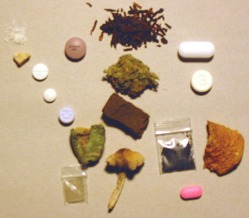Which Types of Hallucinogens Are Most Addictive?
Some hallucinogens are considered to be nonaddictive as they do not cause drug-seeking behavior, dependency, withdrawal symptoms, or compulsive abuse which are some of the main effects associated with addiction. However, other hallucinogenic drugs do cause these issues and can be highly addictive. Here is a list of some of the common hallucinogens from most to least addictive.
PCP
According to the NIDA, “PCP is addictive––its repeated abuse can lead to craving and compulsive PCP-seeking behavior, despite severe adverse consequences.” If someone abuses PCP regularly, addiction can set in very quickly and cause many problems for the individual. Regular PCP abuse and PCP addiction can cause:
- Toxic psychosis
- Craving
- Dependence
- Violent behavior
- Hallucinations
- Flashbacks
- Anxiety
- Homicidal and suicidal tendencies
- Decreased sensitivity to pain
- Dangerous behavior
Someone who is addicted to PCP will need help from medical professionals to fight their addiction and will likely experience effects like memory loss and flashbacks which will persist after they stop abusing the drug.
Ketamine
Ketamine can also be an addictive substance. Someone who takes the drug on a regular basis might find themselves performing dangerous actions in order to get more. The NIDA also states, “There have been reports of people binging on ketamine, a behavior that is similar to that seen in some cocaine- or amphetamine-dependent individuals” which is a strong sign of the possibility for ketamine addiction.

PCP, Ketamine, DXM, and Salvia are all types of hallucinogens.
There have been reports of ketamine addiction and also that the drug causes dependence and tolerance, which often go hand-in-hand with addiction in conditions caused by drugs of abuse.
DXM
DXM is a synthetically produced substance which is similar to codeine and used in over-the-counter cough syrups. Although codeine and DXM are similar, they are not related and DXM is sometimes used as a hallucinogenic drug by abusers (where codeine is and is abused as an opioid).
According to the DOJ, “While studies indicate that DXM is not addictive, some former DXM abusers report experiencing cravings for the drug.”
Salvia
Salvia divinorum is an herb that is a member of the mint family and can cause strong, short-term hallucinations when chewed, brewed into a tea, or otherwise abused. Although it is often abused by people looking for this effect, there isn’t much research on it or on its potential addictiveness. The NIDA Teen states, “It’s not clear if using salvia leads to addiction” and that further testing is needed.
Nonaddictive Hallucinogens
Most of the commonly-abused hallucinogens are actually considered to be nonaddictive by the medical community. These drugs, for the most part, only cause tolerance as one of the signs of addiction, but this can be reversed after several days of abstaining. They do not cause drug-seeking behavior, cravings, or dependence in most of the studies which have been documented.
These drugs are:
- Peyote
- Psilocybin
- LSD
This is not to say that these drugs are safe; they can still cause many dangerous effects. But, with the information we have currently, the most addictive hallucinogenic drugs are believed to be PCP and ketamine, respectively.
- Related Articles
 Are Hallucinogenic Drugs Illegal -
A variety of legality issues are associated with hallucinogenic drugs.
Are Hallucinogenic Drugs Illegal -
A variety of legality issues are associated with hallucinogenic drugs.  Hallucinogens Fact and Fiction -
There are many people who believe strange things about hallucinogens. Unfortunately, many of the claims people make about this class of drugs are not true. According to the National Institute on Drug Abuse, hallucinogens are a large class of drugs that encompasses both synthetic and nonsynthetic types. The older natural types of hallucinogens are usually ...
Hallucinogens Fact and Fiction -
There are many people who believe strange things about hallucinogens. Unfortunately, many of the claims people make about this class of drugs are not true. According to the National Institute on Drug Abuse, hallucinogens are a large class of drugs that encompasses both synthetic and nonsynthetic types. The older natural types of hallucinogens are usually ...  Are All Types of Hallucinogens Dangerous? -
There are a variety of different hallucinogens which all have different effects.
Are All Types of Hallucinogens Dangerous? -
There are a variety of different hallucinogens which all have different effects.  Where your Teen Might be Hiding their Hallucinogens -
Learn the common places for teens to hide drugs so that you can determine whether or not they're using hallucinogens.
Where your Teen Might be Hiding their Hallucinogens -
Learn the common places for teens to hide drugs so that you can determine whether or not they're using hallucinogens.  5 More PCP Facts -
Some PCP facts include the drug's particularly harsh psychological effects, which can lead to violence and suicide, and its common use in conjunction with other recreational drugs.
5 More PCP Facts -
Some PCP facts include the drug's particularly harsh psychological effects, which can lead to violence and suicide, and its common use in conjunction with other recreational drugs.